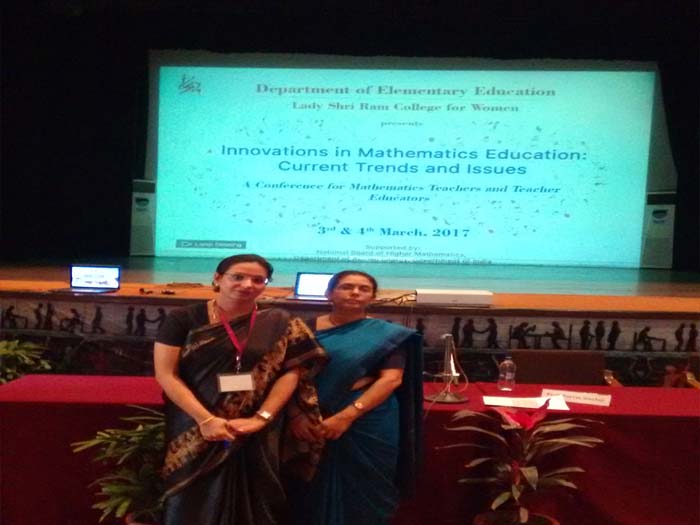Teacher workshop at LSR: 'Innovations in Math Education: Current Trends and Issues'.
While the world is witnessing major changes in education in the field of Mathematics, the teaching of the subject continues to focus on rigid methods of drill and practice across a majority of schools in India. The emphasis on a mastery of procedural knowledge leaves very little opportunity for visualisation, exploration or discovery. These points require a multi-dimensional approach for making Mathematics accessible to all students.
In order to meet the changing demand of teaching the subject, we need to address many challenges pertaining to changes in the curriculum, integration of appropriate technology and teachers preparation.
To address the above, Lady Shri Ram College's Department of Elementary Education, organised a national conference for teachers of mathematics, named Innovations in Mathematics Education: Current Trends and Issues on 3rd and 4th March, 2017. The seminar was attended by Ms.Alka Kanwar and Ms. Minoo Sethi of our School.
[gallery link="file"]
Highlights of the conference were:
1.Talks by eminent persons who have contributed to the teaching of mathematics in India, like Professor R. Ramanujam-Institute of Mathematical Sciences, Chennai, Professor K. Subramanian-Director, HBCSE, TIFR, Mumbai, Dr. Asha Mathur-Former Vice Principal, Lady Shri Ram College, Professor Inder Rana-Emeritus Fellow, Department of Mathematics, IIT Bombay and Professor Parvin Sinclair, School of Sciences, Indira Gandhi National Open University.
2. Hands'-on workshop on the use of technology for teaching mathematics and learning with Geogebra conducted by Ms. Sangita Gulati- Department of Mathematics, Sanskriti School and Dr. Jonaki B Ghosh-Department of Elementary Education, Lady Shri Ram College.
The following themes were discussed at the conference. They were:
1. Innovative practices in a mathematics classroom.
This part of the conference highlighted innovative teaching practices which will help students to engage themselves in mathematical thinking, math lab activities and projects, the development of resources as well as alternative assessment strategies.
2. The role of technology in the teaching and learning of mathematics.
In a world where technology is constantly evolving, it is imperative that teachers of math develop an in-depth understanding, as well as learn to face challenges of integrating various technology tools in teaching. Technology in the form of Dynamic Geometry software (DGS), Computer Algebra System (CAS), spreadsheets as well as hand-held calculators and other devices, are gaining popularity in some Indian schools. A hands'-on session for the same was conducted to give the teacher- educators a better idea of current trends.
3. Teacher knowledge and professional development
Since teachers often grapple with the constraints of time and a large syllabus, pre-service teacher education programmes need to be strengthened in terms of their mathematical content. Emphasis was thus laid on integrating ICT into the curriculum so that teachers can develop new perspectives on integrating technology in their classroom when they become teachers.
4. Innovative mathematical practices in non-formal spaces
This strand of the conference focused on mathematics learnt in and out-of-school settings. The popularisation of mathematics through recreational mathematics, includes games and puzzles as well as mathematics in science, art, music and literature.
The conference helped the teacher-educators in viewing mathematics, not as a static knowledge bound by skills detached from everyday events; instead, it viewed learning mathematics as problem-solving, problem-posing, reasoning, communicating and decision-making skills, that empower the student to think mathematically and relate mathematics to real- life experiences.













